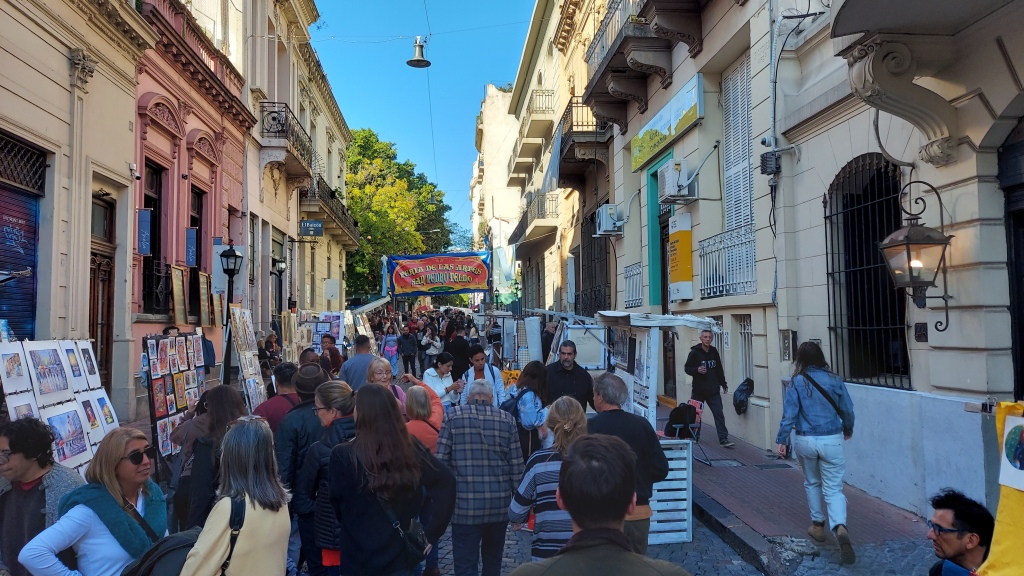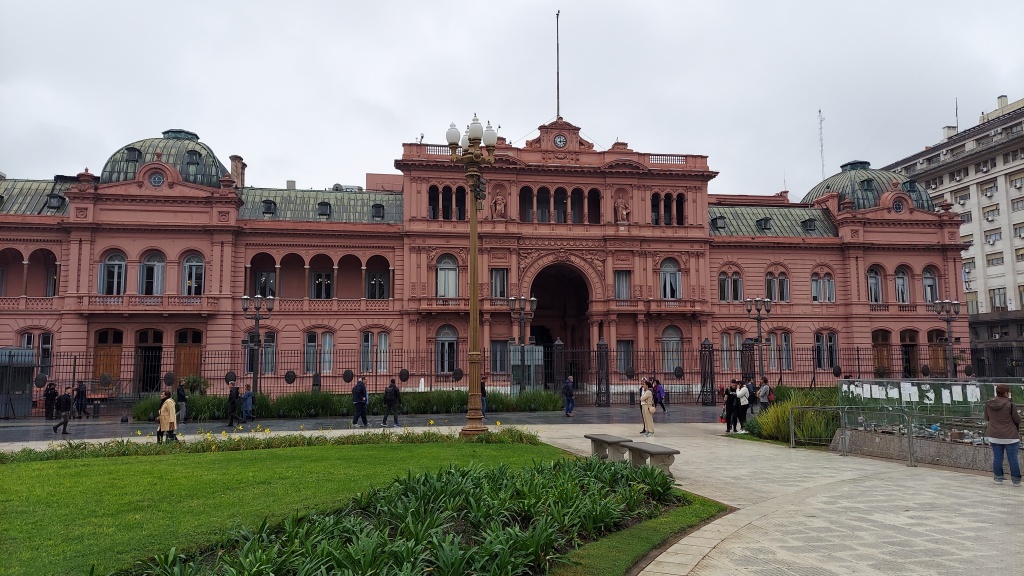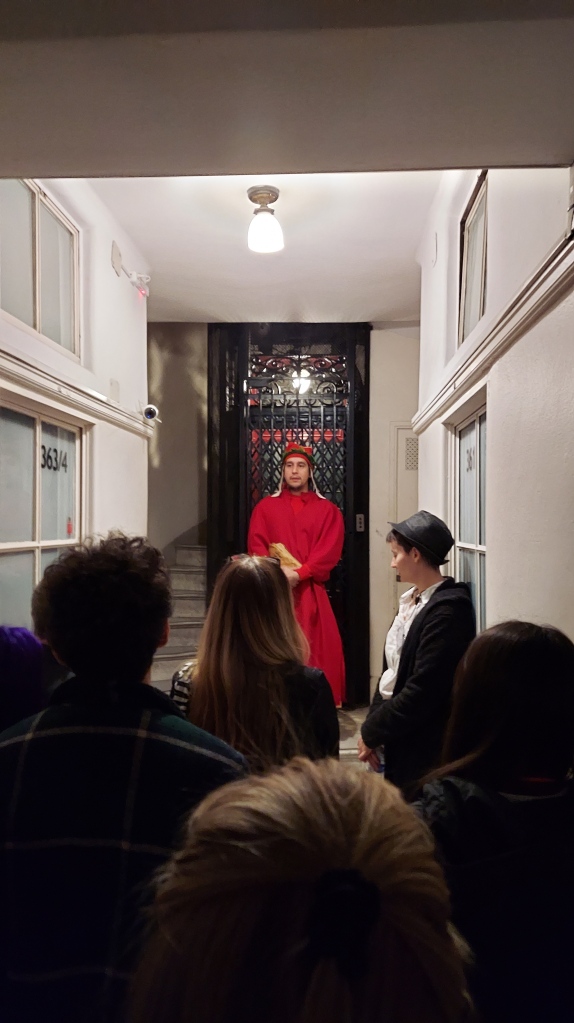This is the third in a four-part series. Part I | Part II
My first impressions of Buenos Aires are mixed. The drive in from the airport is a slog down an apartment-lined highway. Next, I am greeted by a massive protest on the Avenida 9 de Julio, the greatest of the many great porteño avenues, and my cab driver meanders the neighborhood of San Telmo in dismay. The universities of Buenos Aires have risen in rebellion, marching in blocs of matching shirts for their schools, decrying proposed funding cuts by the country’s radical new president. By this evening hour many are disassembling, but some are still pushing forward, chanting and singing, and others have settled under the Obelisco in the city center with beverages. Signage here and there advertises this and future protests, and the next morning, the cleaning crews are rolling through. Argentine protests spawn their own little economy.
When my taxi finally reaches my last second lodging choice for the night, I find my “Presidential Suite” truly unremarkable, a bare bones all-white room with a light that shines through a frosted glass door all night long. (Hey, it was 30-some bucks.) The walk to the ferry dock in the dark the next morning, mostly through an unremarkable office district, does not help. While the Casa Rosada and the Plaza de Mayo are interesting, against a threatening sky and a tight timeline two friends and I are not compelled to linger, and I find myself perhaps suffering from square fatigue after a month of Spanish urban form. (Now, writing from a land far from them, I crave another evening on one of those plazas.)
The grand avenues and plazas are deceiving. Buenos Aires is a gritty city, a metropolis that encompasses all walks of Argentine life. In this country the immigrants never had the chance to move to tract housing in Jersey. They came to places like the Palermo neighborhood, a rough-and-tumble borderland where city met pampa and where streetfighters paved the way for the tango. While in the US the cowboys were always somewhere off in the great western netherland, a legend now filled by projections, in Buenos Aires the gauchos drifted right in. There was no Midwestern buffer between the frontier and the cosmopolitan center of power, and that collision starkly defined the first century-plus of Argentine existence through near endless civil strife between federalists and nationalists. Pampa life was no distant myth here, and even as some of those dusty immigrant suburbs now gentrify, there is still a raw edge to this city.
Predictably, neither copying European high culture nor wallowing in gaucho hagiography has served Buenos Aires well. Certain political figures such as Juan Perón have, arguably, adopted the worst of both. “I want neither progressivism nor criollismo, in the way those words are commonly used,” writes Jorge Luis Borges in “The Full Extent of My Hope,” an essay that holds up a century later. “The first means subjecting ourselves to being almost-North-Americans or almost-Europeans, a tenacious being almost-others. The second, once a word of action…is today a word of nostalgia.” Buenos Aires is a stark collision between two very different worlds, and the nation it rules is still sorting out the twisting strands of those two great stories.
And yet, Buenos Aires is full of gifts from both inheritances, once one learns how to see it. Borges again: “Never have I given myself over to its streets without receiving some unexpected consolation, whether from feeling unreality, from guitars at the back of some patio, or from contact with other lives,” he writes on his city in Evaristo Carriego. In time, I come to understand his sentiment.

The city starts to open up to me when I turn over tour guide duties to my friend Andrew, who studied abroad here. We visit the San Telmo market, an endless string of vendors on a narrow street through a bustling neighborhood of the same name, a delight of maté paraphernalia, art, cookware, Messi and Mafalda swag, CBD brownies, and any other effect one may find necessary. Instead of musicians, tango dancers do the busking; the garb of choice appears to be tracksuits for Boca Juniors, the working-class soccer superpower. Here is a city teeming with life, crowded and edgy, filled with inheritors of the gaucho tradition, even in a metropolis those forerunners would never know.
And then there is the dream of what can be. We tour the Palacio Barolo, a grand office building near the Argentine Congress whose 1920s builders created an homage to Dante: hell in its ornate main hall gilded with gargoyles and dragons, purgatory in the office spaces, and an ascent to paradise in the narrow tower at the top, which culminates in a cupola with a series of balconies and, two floors above that, a glass lighthouse turret that can hold ten vertiginous people for 360-degree views of Buenos Aires at sunset. The city rolls out in every direction, denser than in Borges’ day but aglow in the night, bustling with beauty. As we go about our tour up and down narrow stairs and 1920s elevators, a man dressed as Dante pops up here and there to read cantos from the Divine Comedy, a very Latin American melodramatic flourish that nonetheless sheds light on the vision behind this building.
The day after the wedding, Andrew, his wife Kara, and I spend the night in Palermo Soho, a trendy neighborhood of tree-lined narrow streets and hipster shops. Borges was born here, and many of the low-slung turn of the century buildings remain, enlivened with brilliant color and elaborate mural art, along with some jarring modern additions. Dinner for the three of us plus old roommate Tim is at Don Julio, rated by some critics as the greatest steakhouse on earth. I am in no position to measure it against the competition, but by 1:30 in the morning when our night there is done, I am in no mood to doubt the claim. The butterflied sirloin melts in my mouth, a malbec and a cabernet franc wash it down, the pumpkin and cheese plates just add life, and despite being overstuffed I will indeed have the dulce de leche ice cream for dessert, thank you very much. Food is an art form here, tradition and inventiveness brought together with utmost care. We drift the few blocks back to the Miravida Palermo Soho, a boutique hotel where I have somehow wound up with the lofted penthouse room with a terrace wrapping around two sides of the building. I end my night blissed out on meat and wine, and I say goodnight to my friends and catch the last snippets of revelry in Palermo on the streets below. I rose to a paradise twice in one night.
A confession: I have spent too much of my life in a state of status anxiety. I’ve long run in circles adjacent to considerable wealth and power and enjoyed some of their benefits while never really holding them myself, a position that provides both great fortune through the access it allows and a nonstop sense that I am somehow falling short, have somehow chosen poorly and consigned myself to being a passenger on the grand plans of others. This feeling is exacerbated by certain habits of the current American upper middle class, which include an eternal instinct to downplay any advantages one does enjoy, a sustained myth of equal footing that does not always play out in reality. Too often have I measured myself against opaque but daunting measures of success, queasily collecting Pell grants or opting out of some activities because I cannot afford them, struggling to find the right balance between a knee-jerk frugality and a desire to experience everything my peers are, if not more. It fosters a lingering sense that, no matter how meticulous I have been, I am not quite ready to launch.
Lately, however, I have been able to allow myself a few more flourishes like this terrace at the Miravida Palermo Soho, and I can at least put up the appearance without feeling false. A small achievement, perhaps, but one freighted with some meaning. The ability to move between worlds is a lesson from Georgetown, a recognition that we can contain multitudes, can aspire to snippets of the best of all the worlds we brush through instead of feeling chained to one. I catch myself over dinner in some grumble over my ability to live in certain ways from my perch in Duluth, but on this balcony, I can write that strain away.
Belonging is not a matter of money or title. It is a matter of taste, a matter of belief, of seizing opportunities when they arise. In the grand scheme those things may be small. It is also dependent on finding the right people, and that is by no means small. But here, on a balcony in Buenos Aires, I rest assured that there is nothing false in certain dreams, that a certain life is within my grasp. It is up to me to seize it.


